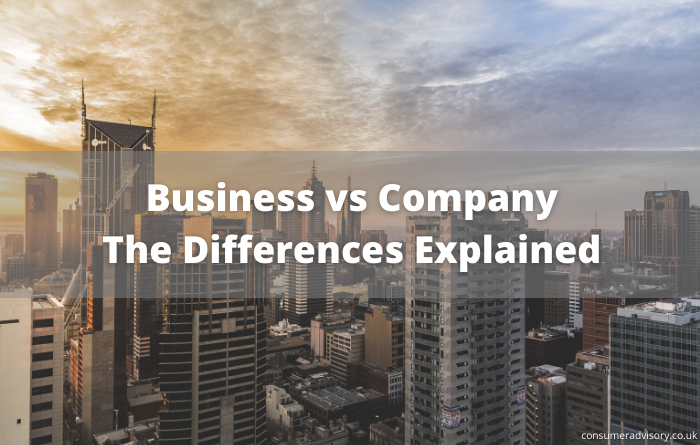
A business and a company sound like they should be the same thing, right? Actually, that’s incorrect.
What is the difference between a company and a business? This may seem like an easy question to answer, but many people get these two words confused. The truth is, a company is actually a type of business. That’s because a business needs to register with Companies House to be able to refer to itself as a company. So, every company is a business, but not every business is a company. Confused yet?
A business is simply the legal entity that conducts commercial transactions. A company, on the other hand, is a type of business that is registered with Companies House. This can include sole proprietorships, partnerships and corporations.
In this article, we’ll explain the key differences that you need to be aware of when it comes to business vs company, from the differences in legal structure to the pros and cons of each option.
Don’t worry, we’re here to explain everything you need to know about businesses and companies, clearing up the confusion and laying down the facts.
A business is an organisation that engages in commercial or professional activity. Businesses can range from a market trader through to General Motors – it doesn’t matter what size your organisation is or how much revenue you generate.
Some businesses may operate under a single name, with a reputation built on its identity. This could even be a sole trader, for example a freelancer or self employed person. Their business will often be run under their own name, with their reputation built in their own name. Their revenue could be as small as £500 per year, but since they are engaging in commercial activity, they are still seen as a business.
At the other end of the scale, global organisations such as Amazon and Apple are also businesses. These large-scale businesses are registered as corporations and have an annual revenue in the billions.
Like a business, a company is a commercial entity that offers goods and services to consumers. However, a company must also be registered with Companies House, also known as incorporating. This incorporation process converts the business into a company, meaning that it becomes a separate legal entity to those that own it.
The company is a legal entity in its own right. This is a contrast to a business, which is the legal responsibility of an individual or group of people. This means that companies can enter into contracts in the same way as a single person, sue people or companies, pay taxes, hire employees and borrow money.

The terms business and company are often used interchangeably, so it’s easy to assume that they have the same meaning. However, this isn’t true. There are a few important differences between a business and a company that you need to be aware of. Let’s take a look at some of these differences.
Every organisation that engages in commercial or professional activity can be called a business. However, only businesses that are incorporated (that means registered at Companies House) can be known as a company. This is why the terms company and business are not interchangeable.
When the company is incorporated, it becomes its own legal entity. This means that a company is a legal entity in its own right, so it can borrow money and sign contracts in its own name, rather than needing to use the name of its owners like a business.
This means that a company is less risky than a business. A business has unlimited liability. This means that if a business is sued, the responsibility falls on the shoulders of the business owners. In contrast, if a company is sued, only the assets of the company are at risk, and the company directors and shareholders only stand to lose their investment into the company, as they are not legally responsible for the debts of the company.
Another difference between a company and a business is the way in which these organisations are taxed.
In a business, the self-employed individual(s) must complete their own tax returns at the end of each financial year. This is known as ‘self assessment’. For partnerships, both business partners will need to complete a partnership tax return. Tax is then paid on any profits through the self-assessment process.
A company is legally required to file an annual corporation tax return at the end of each tax year. This includes all elements of their taxation, and they pay corporation tax according to their corporate tax return.
There are also some key differences in the process of forming either a business or a company. Let’s take a look at both of these processes in detail.
To start a business, you will first need to create a business plan. You can then choose your business name and register your business with HMRC. You’ll also need to consider what types of insurance or licences you might need to operate your business. Once you’ve done these things, you’re ready to get started with your business.
Starting a company is a bit more complicated, as there are more steps within the process. You’ll begin by deciding on a unique company name, as well as a structure for your company. You’ll also need to choose the company directors and appoint a company secretary, as well as deciding on your shareholders or guarantors.
Once you’ve made the key decisions around who will run your company, it is time to prepare your documents. These details detail how the business is going to operate and include information on directors with significant control over its operations. You’ll also need to register your company at Companies House and HM Revenue & Customs (HMRC).

There are a few different types of company that you should be aware of. If you’re unsure on which type of company is right for your organisation, it’s always best to consult with a qualified accountant, who can advise you on the best option for your business.
Here are some of the most popular types of company:
A Public Limited Company, often shortened to PLC, is a company that is owned by the general public, who can buy or sell shares in the company. This type of company often starts out as a Private Limited Company before registering as a Public Limited Company to raise further capital for growth.
In order to become a Public Limited Company, the business requires a minimum of two directors, as well as a company secretary. The business will also need to have a share capital of at least £50,000, with at least 25% already paid up.
Every business that you see listed on a stock exchange is a Public Limited Company. However, there are also many PLCs that are not listed on the stock exchange, but still benefit from the credibility and status of being a Public Limited Company. Shareholders often prefer investing in PLCs as it is seen as a more prestigious position than investing in a Private Limited Company.
Public Limited Companies also benefit from limited liability. This means that the company’s liability is limited to its reserves.
Just like a Public Limited Company, a Private Limited Company, often abbreviated to LTD, is broken into shares. However, rather than being in the public domain, these shares are owned privately and are not available to the public. A Private Limited Company may be owned by a group of shareholders, or it can also be owned by a Non-Government Organisation, also known as an NGO.
Just like in a Public Limited Company, a Private Limited Company has limited liability. This means that the shareholders cannot be held responsible for any debts of the company.
In a Limited Liability Partnership, two or more individuals have responsibility of the company. These companies operate similarly to traditional partnerships when it comes down to internal management and distribution, but they have the added benefit of being protected by their own personal limitations, known as limited liability.
A Royal Charter is a legal document that grants power and recognition to an organisation, stating its objectives for the benefit of those who sign it. The practice dates back as far as 1235 when King Henry III created limited liability companies by issuing special charters with numerous privileges including tax-exempt status. Upon his death in 1272, there were more than 150 Royal Charter organizations operating throughout England!
Nowadays only two types exist: RCs granted under antiquated statutes still governing British industries from centuries past (such as the BBC) which have never been updated since their inception; or newer “RC” organisations established specifically through democratic means within current society – one example of which being the Bank of England.
A CIC, or a Community Interest Company, is a type of nonprofit organization that exists to benefit the community rather than its shareholders. Profits from their work go back into it so they can enhance and achieve social objectives while also reinvesting in order to accomplish these goals, ultimately making life better for everyone around them!

There will always be many advantages and disadvantages when choosing trade with the limited company. We can see more on that in pros and cons of trading as a company.
The main advantage of trading as a limited company is the limited liability for shareholders. This means if the business gets into debt, the shareholders will not be responsible and cannot stand to lose money, other than their investment into the business.
As the company is its own legal entity, it is also legally responsible for its own actions. This means that if the company is sued, the directors and shareholders of the company cannot be held responsible. The company can also sue other companies and individuals in its own right.
A company also has some tax benefits which include corporation tax, VAT, payroll tax and annual return. The business is formally established upon registration of the company which makes it easier if you are planning to get funding or apply for a loan.
Finally, companies are sometimes viewed as being more established and secure than a business. This can make it easier to win contracts, as well as securing funding.
One of the most significant disadvantages in trading with limited company is that the accounting requirements are more complex, meaning that filing your taxes will be more time consuming. This means that you’ll probably need to hire an accountant to take care of your company’s finances and ensure that it is all done correctly.
The process of starting a limited company is also more time consuming, as significant amounts of paperwork are required to register with Companies House. This admin continues throughout the duration of running a company, including the annual tax returns and minutes of board meetings.
It is also more difficult to withdraw funds from a company, as the money of the company and the individual directors are completely separate. This means that any withdrawals must be done correctly, and the tax implications can be high.
There are two key types of business that you should be aware of: a sole tradership and a partnership. Let’s take a look at each of these in more detail.
A sole trader is a person who has control over the business they work in, and all profits belong to them. They are accountable for any debts incurred by running an unprofitable company or if it closes down completely; but at least there’s no risk taken on behalf of other people like shareholders might do with their investments!
A partnership is a type of business where two or more individuals come together to form the business. They share any debt and profit equally until there’s enough money for each person in profits, after which time they get their own slice based on how much work was put into founding it. The agreements establish alternative terms for this relationship before trading begins; these can be made legal through contractual agreement between partners.

There are many advantages and disadvantages when you choose to trade as a business- that’s why being a sole trader is the most popular business model in the UK. So, let’s take a look at the pros and cons of trading as a business in order to get an insight into what that really means.
As a sole trader or a partnership, you are free to withdraw profits whenever you choose. This is simpler as a sole trader, as you don’t have anyone else to answer to. However, in comparison to a company, sole traders and partnerships have more freedom to withdraw funds whenever they choose, without the tax implications of a company.
It is simple to set up as a business. Simply decide on a name and register with HMRC, and off you go. There’s no complex paperwork to fill in from Companies House, and you don’t even need to open a business bank account unless you wish to.
You also have a high level of privacy when you’re operating as a sole trader or partnership. As you don’t need to register with Companies House, your details will not be publicly available. This means that no one needs to know your address or the names of the people behind your company, unless you choose to publish them.
Finally, it’s easy to change your business structure in the future, should you decide that the time has come to incorporate as a company. That’s why many organisations choose to start out as a sole trader or partnership to test the waters, before incorporating later down the line.
The main disadvantage of operating as a sole trader or partnership is that you do not have limited liability in the same way that a company does. This means that financial responsibility falls on the sole trader or partners that make up the company. So, if the business gets into debt or is sued, the business owners are legally responsible and could become bankrupt as a result.
As a sole trader or partnership, it can be harder to take a break from your business. If you are the only person that is earning money, you can feel tied to your business and obligated to continuously work. This can make it difficult to take a holiday and leave you feeling over-worked.
You’ll also find that a sole trader or partnership can be less appealing to clients and other businesses. This is because they can appear less established and therefore less trustworthy. This can put sole traders and partnerships at a disadvantage when compared to companies with limited liability.
Fortune has been named the 500 largest U.S. company by revenue. This list includes private and public enterprises. The Fortune 500 was compiled by Fortune magazine. It comprises the 500 largest companies according to revenue in the US.
Whilst every company is a business, not every business is a company. This is because a company must be incorporated at Companies House to be able to exist as a company. So, whilst some small businesses may be a company, the majority of small businesses are more likely to exist as a sole tradership or a partnership rather than a company.
The distinction between a business and a company may seem like a minor detail but it is actually quite an important one. A business can be profitable and run efficiently without being a company, whilst others may benefit from being a company. This means that your small business could still grow to become successful even if you don’t incorporate as a corporation at this time.
There are pros and cons of operating as both a business and a company. While the business vs company debate will continue for many years to come, we hope we’ve explained the key differences between the two, giving you a clearer idea of which option is right for your organisation.
If you have any doubts about the right structure for your business, we’d always recommend consulting with a qualified accountant.
Copyright © 2025 Consumer Advisory. All rights reserved.